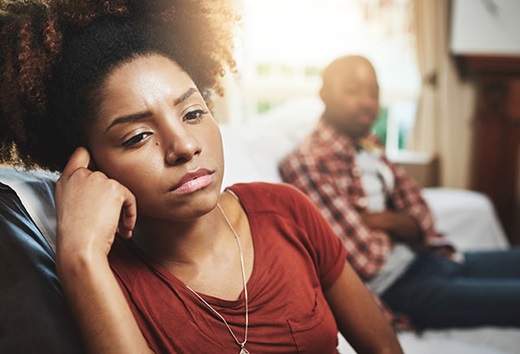If You Get Cancer From Hpv Can You Get It Again
HPV: five Things All Women Should Know
Reviewed By:

In addition to treating patients, Trimble researches vaccines to treat human papillomavirus (HPV). The virus is the most common sexually transmitted infection, with more 6 million Americans infected each year. Y'all've probably seen goggle box ads for the HPV vaccine. If you have kids, your pediatrician has probably recommended the vaccine to baby-sit against some cancers that are linked to HPV. It can sound pretty scary: a common infection that causes cancer.
Then should women worry about HPV? According to Trimble, the reply is no.

If Yous Feel Something, Say Something: Preventing and Detecting Gynecologic Cancers
Rebecca Stone, M.D., a Johns Hopkins gynecologic oncologist and surgeon, explains gynecologic cancer risks, the all-time forms of prevention for you and your loved ones, and possible signs and symptoms.
Trimble discusses five things she wants women to know about HPV, cancer risk and the importance of vaccines.
-
Women Don't Demand to Feel Ashamed Most HPV
"Anyone who's ever had sex may have been exposed to HPV," says Trimble, calculation that she wishes she knew how to get rid of the unnecessary stigma associated with the affliction.
"Raising awareness can give you choices, and knowing you have choices is empowering."
-
Certain Types of HPV Are Linked with Cervical Illness
While more than than 100 types of HPV exist, only about a dozen of them are associated with cervical disease. "Together, HPV xvi and HPV xviii account for lxx percent of all cervical disease," says Trimble. Genital warts are a course of low-risk HPV, and they do not cause cancer.
Doctors monitor HPV with Pap tests that wait for abnormal cervical cells called lesions. Low-grade lesions — where the changes are only mildly aberrant — oft clear up on their own. These are not considered precancerous.
All cervical cancers arise from untreated, high-grade lesions, which do contain precancerous cells. If your immune arrangement is healthy, it typically takes about 10 to xv years for cervical cancer to develop from a high-grade lesion. But not all loftier-class lesions become cancer — a person's own immune system tin eliminate them.
-
HPV Very Rarely Becomes Cervical Cancer
While HPV does crusade cervical cancer, the chance of developing cervical cancer from the virus is still quite low.
For ninety percent of women with HPV, the condition will articulate up on its own inside ii years. Only a small number of women who have one of the HPV strains that cause cervical cancer will e'er actually develop the illness.
Cervical dysplasia, where prison cell changes occur in the cervix at the opening to the uterus, is a more than mutual outcome from HPV infection.
"I have a huge grouping of patients with persistent HPV infection who have never had any reason to need treatment," Trimble says. "So if you lot have HPV, yous tin can put it on your nuisance listing and take it off your worry list."
-
HPV Causes Caput and Neck Cancers Also
One of the biggest — but lesser-known — dangers of HPV involves the take chances of head and cervix cancer, with HPV spreading to the throat via oral sex activity.
"The rate of cancers in the back of the pharynx is skyrocketing," Trimble says. "Experts are using the word epidemic to draw information technology. It'southward on track to outpace cervical cancer."
While women can become these cancers, nigh of the people who go it are heterosexual males. At that place is currently no way to screen for it, making it all the more important that parents go their children — including boys — vaccinated.
-
Vaccines Salvage Lives
Trimble thinks it'south sorry that at that place's so much controversy over the HPV vaccine, which has overwhelmingly been proven safe and tin can prevent devastating cancers linked with HPV. In fact, Trimble has dedicated her research to developing therapeutic vaccines capable of fighting HPV once someone has contracted the virus. (Preventive vaccines are given to healthy people to ward off infections; therapeutic vaccines are used to aid people who already take a disease.) In a contempo study using a therapeutic vaccine, she and her team were able to successfully treat one-half of patients who had high-grade lesions, and they're working on raising that number.
"At least 20 percent of human cancers are caused by a specific infection," says Trimble. "That implies it would exist possible to foreclose or care for illness past helping the immune organisation recognize infection. Once yous've washed that, you've won."
Ultimately, Trimble says HPV is a wimpy infection, and she's encouraged past the huge immune responses these therapeutic vaccines can trigger.
As she explained in a TED talk called "Boot Cancer's Butt," Trimble says, "My goal is to cure cancer, and it's start to expect like that's possible."

Sign Up for Our Free Newsletter
One of the best things you can do to protect and amend your wellness is to stay informed. Your Health is a FREE e-newsletter that serves as your smart, unproblematic connection to the world-course expertise of Johns Hopkins.
Source: https://www.hopkinsmedicine.org/health/conditions-and-diseases/human-papillomavirus-hpv/hpv-5-things-all-women-should-know
Post a Comment for "If You Get Cancer From Hpv Can You Get It Again"